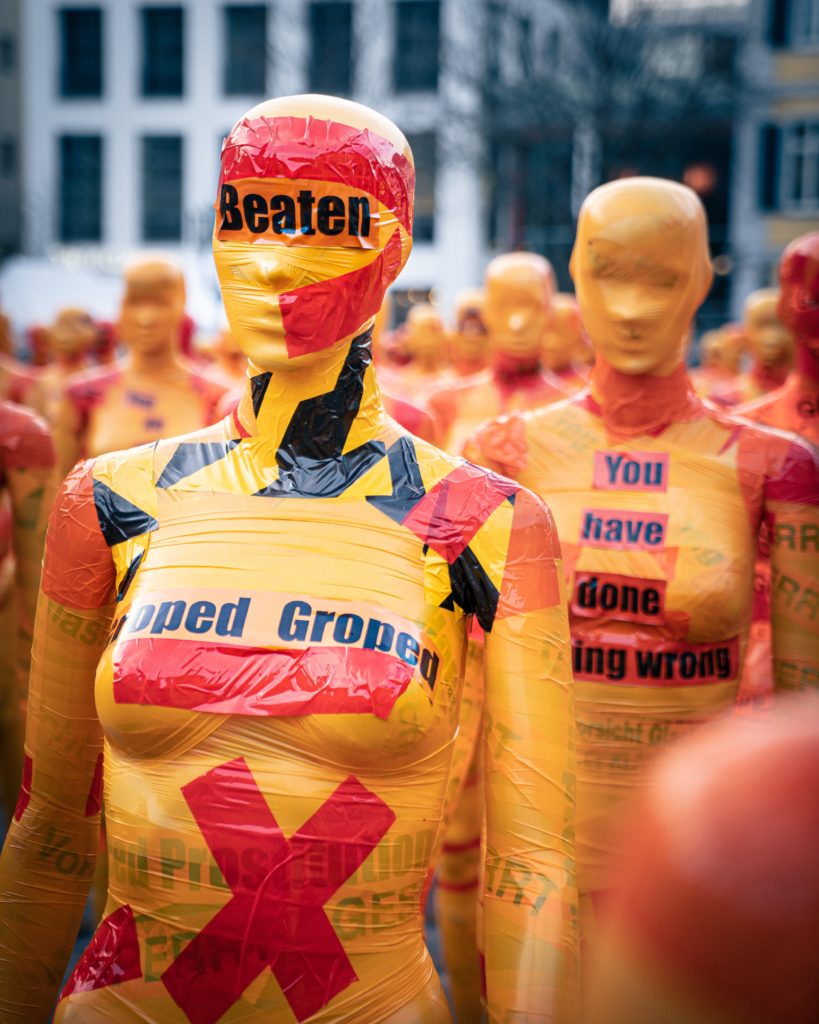“I don’t want to die,” said Emine Bulut, in agony, while trying to stop the blood protruding from her neck. These words have been shouted out by thousands of Turkish women in demonstrations across the country each time a woman was killed by a man, often someone related to or close to her.
by Merve Kayikci
Emine Bulut died from the injuries inflicted on her by her ex-husband in the middle of the street. The attack was filmed by witnesses, and the final moments of a woman who was screaming to be saved were visible to everyone. Outrage gripped the nation – a nation that wakes up to dozens of cases of femicide each day – maybe because Emine’s daughter was standing right next to her, pleading for someone to help her mother, or maybe because a woman’s life being snuffed out in such a violent manner had never been so shockingly visible.
Whatever the reason, Emine Bulut became a symbol for all women who were killed by men and whose loved ones had never been able to find justice. “I don’t want to die” shouted thousands, demanding that authorities recognise femicide and sanction the crime in tandem with the law.
Indeed, it is not that the Turkish penal code is insufficient when it comes to prosecuting perpetrators of femicide, but the enforcement of the law is a completely different matter. Even if there is compelling evidence, men are often released pending trial for good behaviour. Their sentences are reduced because “their sense of honour was attacked” by the victim, or they were “heavily provoked”. Whatever these things mean, they are highly controversial and rooted in the idea of how Turkish lawmakers and the judiciary understand gender.
Whatever the reason, Emine Bulut became a symbol for all women who were killed by men and whose loved ones had never been able to find justice.
In a very controversial move, Turkish President Recep Tayyip Erdogan withdrew Turkey from the international treaty commonly known as the Istanbul Convention on March 20 with an executive decree. This means that the withdrawal was not discussed in the parliament, but was abruptly issued after midnight on a Saturday morning while everyone was still asleep. However, Erdogan and other conservative government officials had hinted that they were preparing to withdraw from the convention, saying it damaged family unity, encouraged divorce, and that its references to gender equality were being used by the LGBT community to gain broader acceptance in society.
One of the most alarming debates was that concerning gender. A conservative politician said that the Istanbul convention was built on the concept of gender, which held that “identities and the biological sexes of men and women were constructed by society, and envisioned a fight against it”. The same politician said the convention was troubling because it did not accept the distinction of the sexes.

Erdogan who repeats that he does believe in the equality of sexes with every opportunity he gets, backed this argument. “Feminists do not understand motherhood,” he said in a 2014 speech, emphasising that the highest status a woman could attain was motherhood. The reason for domestic violence was because people were not pious enough, according to Erdogan, who once said “A Muslim believer would not commit domestic violence”. What he meant was that if women remembered their reason for existence, motherhood, and stuck to their traditional gender roles, then we would not have domestic violence. These statements of course cause raised eyebrows among activists and some opposition politicians, but how much they can do in a country where even a social media post can land you in prison?
This does not mean that the women’s movement has stopped their fight for equality and what is more, dignity. Thousands of women have demonstrated – and still demonstrate – against the withdrawal from the convention. The police force, which is very ineffective when it comes to protecting women from violent spouses, was very effective in forcefully detaining protestors. But the women’s movement would not be deterred as this is a matter of life or death for them.
Although Turkey was one of the first countries to ratify the convention, the conservative outlook on gender on the part of the judiciary and law enforcement prevented any meaningful change.
The biggest struggle is that the convention was not effectively implemented in the first case. Although Turkey was one of the first countries to ratify the convention, the conservative outlook on gender on the part of the judiciary and law enforcement prevented any meaningful change. The emphasis on protecting the family in a way evolved into protecting the man – however violent he may be – because a family without a father is incomplete.
In her column, conservative journalist Hilal Kaplan said that the definition of violence was too broad in the convention and it allowed for the state to intervene in the private sphere. What she was criticising was the relative ease with which women could obtain restraining orders against their husbands thanks to the convention. Conservatives like Kaplan ardently argued that this was contradictory to Turkish family values.
There is a very famous saying in Turkish which roughly translates to “the arm breaks but the bones are concealed,” meaning that even if you are in pain or experiencing something bad you should go through it in silence and in private. This saying is often repeated in familial issues. The man, as the head of the family, should not be humiliated and degraded by revealing his flaws in public according to this thinking. Let us just close our doors and draw our curtains as our grandmothers did decades ago. Let us not talk about the scores of women who are beaten, abused, and even killed in the “safety” of their homes.

What is more alarming is that despite the protests of thousands of women, Turkey is turning this traditional approach to gender into a state policy. The Istanbul Convention was the first step but only last month Erdogan was discussing establishing an all-female university. The topic first came up in a trip to Japan in 2019, when Erdogan was awarded an honorary doctorate by the Mukogawa Women’s University. Ever since that day, Erdogan has been ordering his aids to do research on the matter and prepare the grounds for a similar institution in Turkey. He even took a solid step and even included the opening of such a university in the 2021 Presidential Annual Program. These developments have come amid discussions about establishing pink buses just for women and separate compartments in trains.
Female activists outraged at these proposals are wondering how further the government will press on to remove women from society and limit their moves. The core problem here is that the victim is framed as the source of the problem, and this framework is supported with religious texts taken out of context and traditionalist discourses. However, even those staunch traditionalists who value motherhood over anything else are failing to protect mothers from being killed in front of their children.
The core problem here is that the victim is framed as the source of the problem, and this framework is supported with religious texts taken out of context and traditionalist discourses.
Emine Bulut filed a complaint against her husband at the local police office only four hours before her death. The police sent her home and did not put her complaint into effect by sending it to the prosecutor. She said she was afraid of being harmed, but she was not taken seriously. One of the policemen later said he did not see any reason for precautionary action to be taken. He said during those 29 minutes she was in the police station, Emine Bulut had only complained that her husband had stalked her. Had she been taken seriously maybe she would not have bled to death in front of her daughter? Let us hope the women’s movement will be the one that comes out victorious from this struggle, and the system that could not protect Emine Bulut will protect her daughter.

Merve Reyhan Kayikci is an affiliated researcher for the H2020 funded Religious Tolerance and Peace Project (RETOPEA). She obtained her PhD from the IMMRC, KU Leuven. Her doctoral work investigated the intersections of volunteering and ethical self-becoming among Belgian Muslim female volunteers. She is still an affiliated staff member in the Department of Social and Cultural Anthropology at the University of Leuven, Belgium. Kayikci is one of the founders of the think tank, the European Center for Populism Studies. She is the author of “Islamic Ethics and Female Volunteering: Committing to Society, Committing to God”. She is also the co-editor of “Muslim Volunteering in the West: Between Islamic Ethos and Citizenship” and “European Muslims and New Media”.
